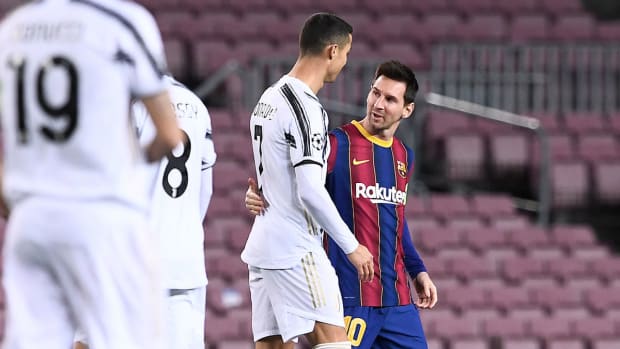While there's an urge to anoint Kylian Mbappé and Erling Haaland as their successors, remember that the heights they have achieved are not normal.
The sun, slowly, is setting. That Cristiano Ronaldo and Lionel Messi are not what they once were is not news, but with each passing month, it feels like there is another landmark in their long, slow farewells. Barcelona’s Champions League exit was confirmed by Wednesday’s 1-1 draw at Paris Saint-Germain, which, after Juventus’s exit on Tuesday, means that for the first time in 16 years neither Messi nor Ronaldo will play in the Champions League quarterfinals. Prior to last season, at least one had made the semifinals every season dating back to 2004-2005.
The temptation, particularly after the way they’ve played in the last 16, is immediately to anoint PSG's Kylian Mbappé and Borussia Dortmund's Erling Haaland as their successors. Haaland is 20 and a phenomenon. He is quick and powerful and, when he’s running at defenders, inspires a terror like no player since the Brazilian Ronaldo. He has already scored 20 Champions League goals—in just 14 games. It took Cristiano Ronaldo 56 games to reach that mark and Messi 40. That’s not an entirely fair comparison given Messi and Ronaldo both began as wide players in an age in which comparatively few goals came from wide, but still, Haaland’s record is incredible.
Mbappe is 22 and was the key figure in PSG’s first-leg victory over Barcelona, scoring a hat trick. He was quieter on Wednesday, but still converted a penalty. His pace, touch and range of finishing are extraordinary. He's the youngest to reach 25 Champions League goals.

Perhaps the next decade will be dominated by the pair as the past decade and a bit as been dominated by Messi and Ronaldo. Haaland and Mbappé certainly have the potential. But the era that is coming to an end is not normal. Nothing similar has ever happened before. Messi and Ronaldo have plenty of advocates who would claim they are the greatest players of all time. Few would doubt they are both in a putative top 10.
Just because we’ve become used to two such talents operating simultaneously doesn’t mean we should believe that will necessarily happen again. But it’s not even just that the pair were both around at the same time. It’s that, after Ronaldo had gotten the better of Messi in the 2008 Champions League semifinal and Messi had gotten the better of Ronaldo in the 2009 Champions League final, they spent nine years coming up against each other again and again in one of the greatest club rivalries in world football.
For perhaps six years the Clasico was the pinnacle of the game: on the one side the team-based possession of Barcelona and Messi; on the other the more individualistic virtuosity of Madrid and Ronaldo. They were two clubs who stood for something, who seemed opposed in every possible way, who genuinely disliked each other, and Messi and Ronaldo seemed inspired to greater heights by that.
And yet there is a paradox here. This era of the two great individuals has been a time when football has become more complex and sophisticated than ever before. Messi was at his best, and won two of his four Champions Leagues, under Pep Guardiola, whose juego de posicion demands intense application and buy-in to an entirely team-driven model. Accommodations always had to be made for the more individualistic Ronaldo, which is perhaps why he was never quite is successful in La Liga as he probably should have been, but the midfield of Casemiro, Toni Kroos and Luka Modric and the selflessness of Karim Benzema provided enough structure for him to shine.

The cliché has it that football is a simple game, but it is not, not really. This compressed season has meant managers who favor a pressing game have found it impossible to prepare for games with the same level of detail as before. The result was wildness in the early part of the season followed by extreme caution. Those patterns and interactions, the mechanisms clubs work on every week, are what differentiates the very best from the next level down in the modern game.
Great individuals have a part in that, of course: Messi’s genius added to the Guardiola philosophy gave that great Barcelona a crucial element of unpredictability. But what is also clear about this age is that it is a time in which marketing and social media profile matters to elite clubs almost as much as performance in the pitch–which is why there are those at Juventus who claim that the Ronaldo signing, failure as it has been in football terms, has been a success in raising awareness of the brand. Certainly there are plenty of club directors happy to sign a big name without any real thought as to the overall structure.
And that’s why any assumption we are unquestionably moving into a Haaland-Mbappé era should be resisted (quite aside from the fact that it’s probably a little unfair on the likes of Robert Lewandowski, Mohamed Salah, Kevin De Bruyne and perhaps even Neymar). They are superb prospects, but quite apart from the possibility of injury or loss of form, the greatest success in modern football is born of structure.